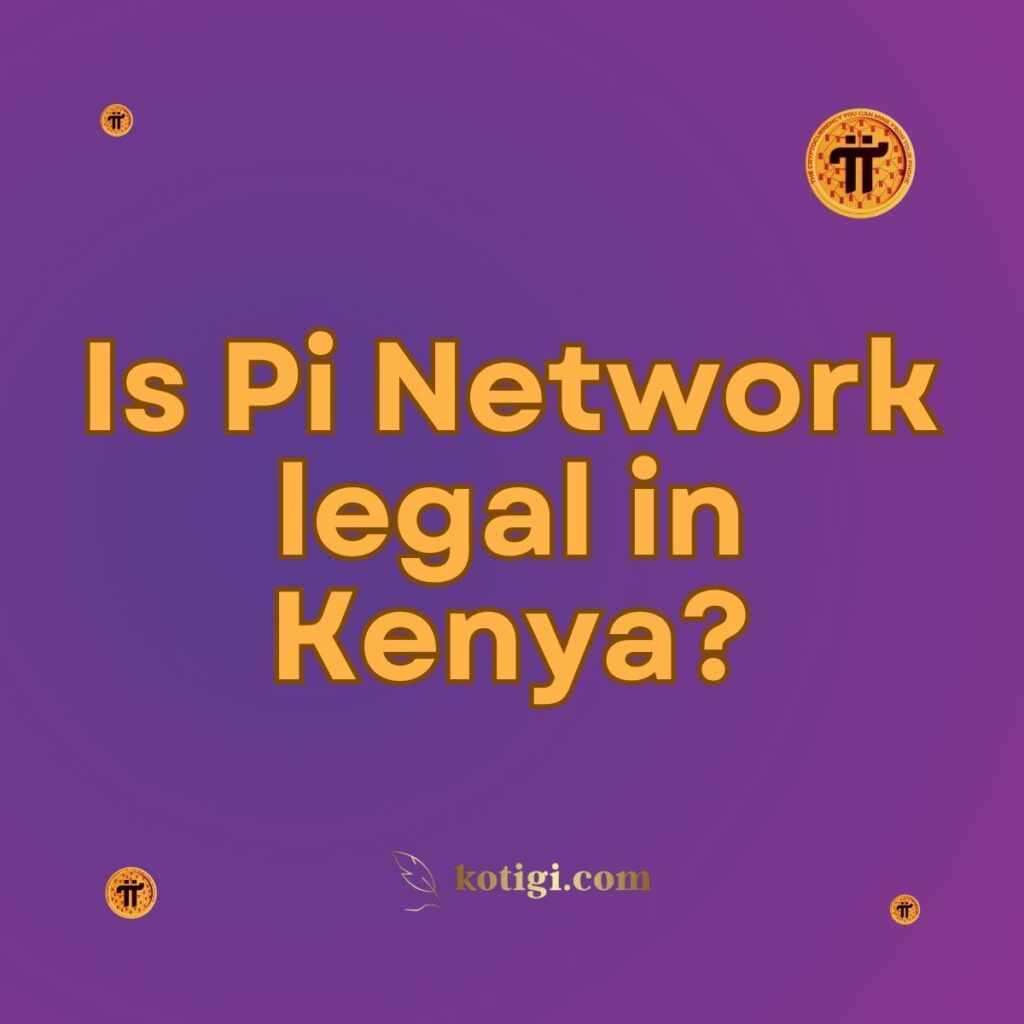
Is Pi Network legal in Kenya?
Pi Network is not officially regulated or banned in Kenya. While the Central Bank of Kenya (CBK) has issued warnings about the risks associated with cryptocurrencies, it has not taken any direct action against Pi Network. Users in Kenya can participate in Pi Network’s mining and activities, but they should be mindful of the evolving regulatory environment surrounding digital currencies in the country.
Introduction
Cryptocurrency adoption in Africa has been steadily rising, with Kenya being one of the notable countries where digital currencies have gained significant traction. Despite this growing interest, the legal landscape around cryptocurrencies, including Pi Network, remains murky. Kenya’s government has yet to establish a clear regulatory framework for decentralized digital currencies, leaving many wondering: is Pi Network legal in Kenya?
In this article, we explore the legal standing of Pi Network in Kenya, the regulatory framework for cryptocurrencies, and what users should be aware of when engaging with Pi in the country.
1. Kenya’s General Approach to Cryptocurrencies
The Kenyan government has historically been cautious when it comes to digital assets like cryptocurrencies. However, no explicit regulations have been enforced, creating a relatively free environment for crypto adoption.
1.1 Central Bank of Kenya’s Stance on Cryptocurrencies
In 2015, the Central Bank of Kenya (CBK) issued a warning to the public about the risks associated with cryptocurrencies, including Bitcoin and other digital currencies. The CBK cautioned that cryptocurrencies were not considered legal tender and that the government did not provide any oversight or protection for users of these digital assets. This statement, however, did not constitute a ban but rather an advisory on the associated risks.
1.2 Impact on Pi Network
Since Pi Network is still in its early stages and does not involve direct monetary transactions at this point, the CBK’s advisory does not directly apply to its mining activities. This means that Pi users in Kenya are not subject to any formal restrictions, although they should exercise caution due to the broader warnings issued by the central bank.
1.3 Government’s Focus on Consumer Protection
Kenya’s financial regulators are primarily focused on consumer protection and ensuring that citizens are not misled or exploited by cryptocurrency schemes. This focus may influence future regulations on digital currencies like Pi Network, particularly as the network transitions from mining to trading.
2. The Legal Ambiguity of Pi Network in Kenya
Kenya’s current regulatory framework does not explicitly address Pi Network or any other specific digital currencies, leaving the network in a legal gray area.
2.1 Lack of Cryptocurrency-Specific Regulations
Kenya does not have specific laws that regulate or ban the use of Pi Network. The absence of cryptocurrency-focused regulations creates an environment where digital assets can be explored, but with caution. Pi Network users can mine and participate in the ecosystem without facing legal repercussions, but there is uncertainty about how this situation might change in the future.
2.2 Future Regulation Concerns
As Kenya continues to grapple with the rapid growth of cryptocurrencies, the government may introduce more detailed regulations. This could include legal frameworks that directly impact decentralized networks like Pi. Until such regulations are established, Pi Network exists in a legal gray zone in Kenya.
2.3 Risks of Legal Enforcement
While Pi Network is not currently targeted by any legal action in Kenya, the potential for future regulation or enforcement exists. As with any decentralized digital network, users should stay updated on any developments that may affect the legality of their activities.
3. Regulatory Risks for Pi Network Users in Kenya
Although Pi Network operates legally in Kenya for now, there are several potential regulatory risks that users should consider as the legal landscape evolves.
3.1 Risks Associated with Future Cryptocurrency Regulation
The Kenyan government has expressed interest in regulating cryptocurrencies to protect consumers and maintain financial stability. If future regulations impose restrictions on decentralized digital currencies, Pi Network users could face legal challenges related to mining, trading, or transferring Pi coins.
3.2 Potential for Restrictions on Peer-to-Peer Transactions
One of the primary goals of Pi Network is to enable peer-to-peer transactions using Pi coins. However, Kenya’s central bank has raised concerns about the use of cryptocurrencies for transactions, and it is possible that future regulations may limit or prohibit this type of activity. Pi Network users should be aware that they might face legal barriers to using Pi coins for payments or services.
3.3 Data Privacy and Security Concerns
Data privacy laws in Kenya are developing, and Pi Network users should be cautious about the security of their personal information. While there are no legal requirements specifically related to Pi Network, users must ensure that they are complying with Kenya’s Data Protection Act, which governs the collection and use of personal data.
4. The Potential for Cryptocurrency Regulation in Kenya
As the use of digital currencies continues to grow in Kenya, the government is likely to introduce more comprehensive regulations that could affect Pi Network.
4.1 Introduction of New Cryptocurrency Laws
Kenya has expressed interest in formalizing cryptocurrency regulation to create a safer environment for users. The introduction of cryptocurrency-specific laws would provide more clarity on the legal standing of Pi Network and other digital assets. These laws could either restrict or support the use of Pi Network, depending on the government’s approach.
4.2 Central Bank of Kenya’s Potential Role
The Central Bank of Kenya could play a significant role in shaping the future of Pi Network in the country. If the central bank chooses to regulate digital currencies, it may require platforms like Pi Network to adhere to certain standards, such as anti-money laundering (AML) requirements or Know Your Customer (KYC) processes. This would provide a clearer legal framework for Pi users in Kenya.
4.3 International Influence on Kenya’s Regulations
Kenya’s cryptocurrency regulations may also be influenced by global trends. If international bodies or major trading partners adopt favorable policies toward decentralized networks, Kenya could follow suit. This would pave the way for Pi Network to operate more freely within the country.
5. Pi Network’s Efforts to Ensure Regulatory Compliance
Pi Network operates globally and aims to comply with local regulations in every country, including Kenya.
5.1 Know Your Customer (KYC) Procedures
Pi Network has implemented a Know Your Customer (KYC) process to verify the identities of its users. This ensures compliance with international standards for financial transactions and could help Pi Network align with Kenya’s future regulatory requirements. KYC verification could also help protect Kenyan users from fraud and ensure that they meet any legal obligations related to identity verification.
5.2 Pi Network’s Commitment to Legal Compliance
Pi Network has expressed its intention to comply with local laws and regulations in every country where it operates. In Kenya, this could mean adjusting its services or user requirements to align with any new cryptocurrency laws that are introduced.
5.3 Collaboration with Regulators
As Pi Network grows, it may seek to collaborate with regulators in Kenya to ensure that its platform is fully compliant with local laws. Engaging with the government and regulatory bodies could help Pi Network establish a legal presence in Kenya and avoid future legal issues.
6. What Kenyan Users Should Consider?
While Pi Network is not illegal in Kenya, users should be mindful of the potential regulatory changes that could impact their participation.
6.1 Stay Informed About Local Laws
Kenyan users of Pi Network should stay updated on any changes to cryptocurrency regulations. As the government may introduce new laws that affect Pi’s legality or use, staying informed will help users avoid potential legal challenges.
6.2 Be Cautious with Future Transactions
Although mining Pi is not currently prohibited in Kenya, future restrictions could affect peer-to-peer transactions or the trading of Pi coins. Users should be cautious when engaging in financial activities involving Pi and ensure that they are in compliance with any new regulations.
6.3 Protect Personal Data
Data privacy is an important consideration for Pi Network users in Kenya. Users should ensure that their personal data is secure and that they are compliant with Kenya’s Data Protection Act. Pi Network’s KYC process helps with data security, but users should also take their own precautions to safeguard sensitive information.
Conclusion
Pi Network is not illegal in Kenya, but the country’s cautious approach to cryptocurrencies creates some uncertainty around its long-term legality. Users in Kenya can currently mine and participate in Pi Network without legal consequences, but the government’s evolving stance on digital assets could change this in the future. It is important for users to stay informed about regulatory developments, avoid prohibited transactions, and comply with any new laws that may affect their activities within the Pi ecosystem.
Key Takeaways
- Pi Network is not banned or regulated in Kenya, but the Central Bank has issued warnings about cryptocurrency risks.
- Kenya’s legal framework for cryptocurrencies is still developing, which could affect Pi Network’s future legality.
- Kenyan users should stay informed about potential changes to cryptocurrency laws and be cautious when engaging in Pi-related activities.
- Pi Network’s KYC process ensures compliance with international regulations and could help users align with future Kenyan laws.
- Data privacy is crucial for Pi users in Kenya, and users should ensure they are compliant with the country’s Data Protection Act.





